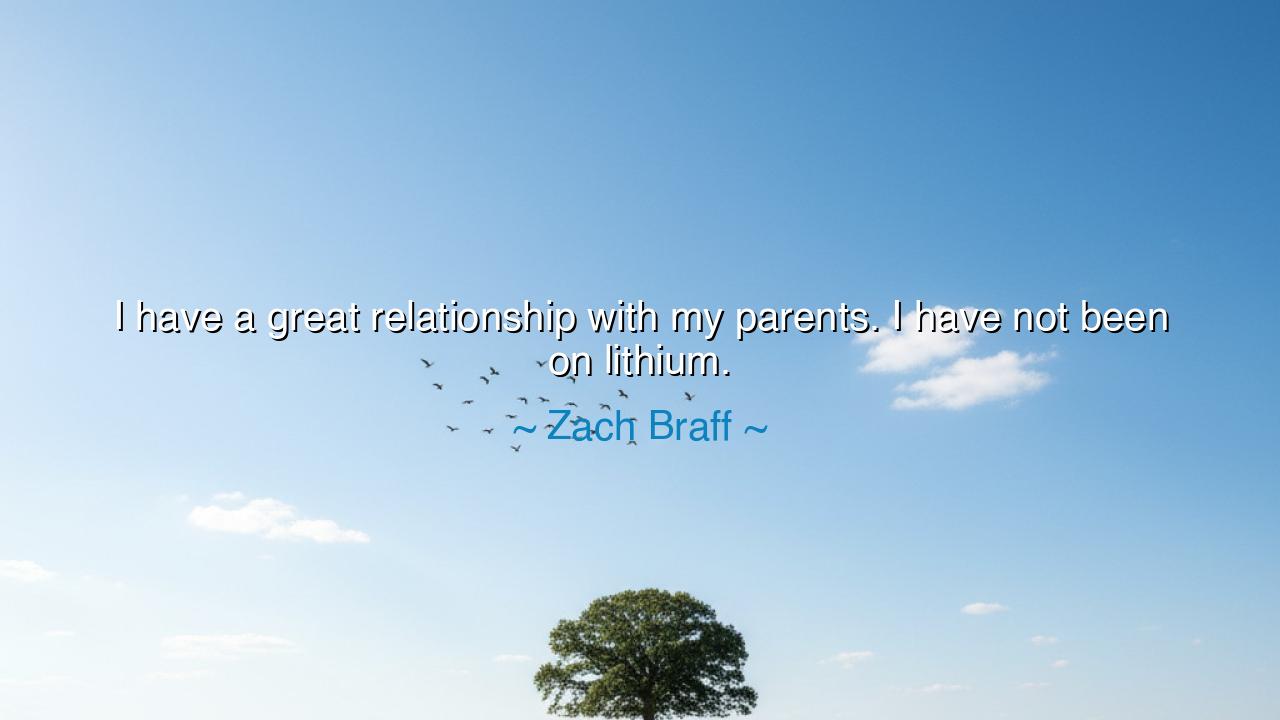
I have a great relationship with my parents. I have not been on






In the realm of family and the shaping of the self, the bonds between parent and child are among the most enduring and defining. Zach Braff speaks with clarity and simplicity when he declares, “I have a great relationship with my parents. I have not been on lithium.” These words convey a rare harmony, a state in which the spirit is balanced not by external aid alone but by the nurture and guidance of those who gave it life. The ancients understood that the household is the first temple, and the family the first school of virtue and understanding.
To possess a great relationship with one’s parents is to enjoy a foundation of trust, respect, and affection that supports the soul in all endeavors. Braff’s reflection reminds us that the character and peace of the self are often forged in the crucible of family, where love and discipline coexist. The heart that is nurtured in such a way grows resilient, capable of facing life’s trials with confidence and grace.
The mention of lithium — a modern remedy for imbalance — highlights the significance of stability achieved through natural bonds rather than reliance upon external intervention. In this context, Braff celebrates the wholeness of his upbringing, implying that emotional and psychological balance can be cultivated through love, guidance, and understanding, rather than solely through chemical means. It is a testament to the power of relationships in shaping human equilibrium.
The origin of this insight is ancient and universal. Across cultures and generations, sages and philosophers have taught that the family is the crucible of character, that virtue and stability are first learned in the home. From the stoics of Greece to the moral philosophers of the East, the enduring truth is clear: the strength of one’s inner life is inseparable from the care and connection given by those who nurture it.
Thus, let this teaching endure: treasure your relationship with your parents, for it forms the root from which all other growth springs. When the heart is tended with love and guidance, it gains a balance that endures beyond the trials of life. Even in the modern world, where remedies and interventions abound, the wisdom of familial connection remains timeless, a sanctuary for the soul and a foundation for a life well-lived.






Nnhatdeptrai
Zach Braff’s comment about having a good relationship with his parents while not needing lithium is an interesting perspective on mental health. It makes me wonder, though, if it’s suggesting that some people can manage without medication simply by having strong personal relationships. How does this idea align with the reality that not everyone has that kind of support? Should we view mental health purely as a matter of personal or familial relationships, or does it need a more systemic approach?
TLTran Thi Linh
I find Zach Braff’s quote intriguing, especially the mention of not being on lithium. It seems like he’s pointing out that strong familial relationships could potentially play a role in his mental well-being. But what if someone doesn’t have that kind of support from their family? Does it suggest that relationships and family are a form of healing, or is there a broader conversation about mental health and its treatment?
UGUser Google
Zach Braff’s statement about his parents and not being on lithium raises some interesting thoughts on mental health. It’s great to hear that he has a positive relationship with his parents, but it also makes me wonder—how much of mental health and medication is tied to personal circumstances, like family dynamics? Do you think family support can sometimes be enough to manage mental health, or is medication still necessary for some?
TTtran319 tra
Zach Braff’s comment about his relationship with his parents is refreshing. It’s clear that he values his family connection. But I can’t help but wonder—what’s the connection between not being on lithium and his relationship with his parents? Does it imply that maintaining a strong family bond has kept him grounded, or is there more to the story about how he’s managed his mental health without medication?